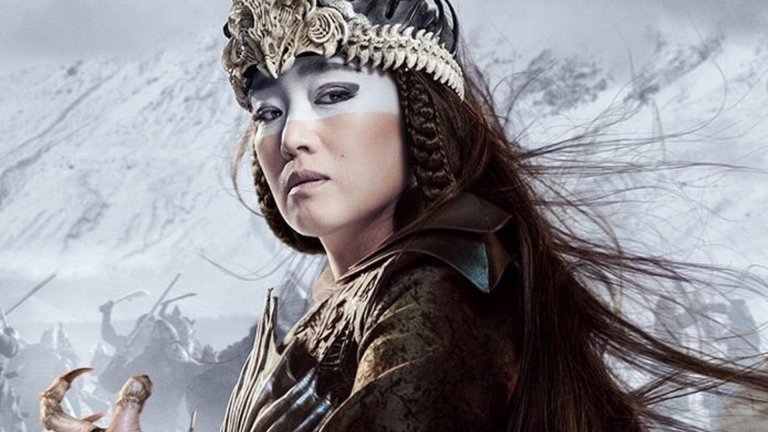How Mulan’s Main Antagonist Almost Breaks the Disney Mold
Xianniang, the main antagonist in the live-action Mulan, is not Disney's standard evil witch.

This article contains MAJOR spoilers for Disney’s Mulan. You can read our spoiler-free review of the film here.
A recurring visual motif in Disney’s 1998 animated Mulan is the titular warrior staring at her own face, rendered unfamiliar by makeup and wondering at how to reconcile the image of that stranger with the truth of herself hiding inside. The film’s core “I Want” song, “Reflection,” articulates this ambivalence, this sense of carrying two selves, with lyrics like: who is that girl I see / staring straight back at me / why is my reflection someone I don’t know. The Mulan (Yifei Liu) of 2020, however, doesn’t have to peer at her own blurred reflection in a pond. Instead, those alternate selves are made flesh. She confronts her reflection in the faces of her sister Xiu (Xana Tang), and to a much greater extent the Rourans’ warrior-witch Xianniang (Gong Li): the two potential futures available to her. Throughout the course of the film, Mulan forges a new, third future that she makes reality. And she probably couldn’t have done it without her main antagonist: Xianniang.
From Xianniang’s first scene with Böri Khan, the antagonist is presented as the cautionary tale for what could have been, had young Mulan not heeded her father’s advice to hide her qi as she reached womanhood: Xianniang was exiled from her home for refining her qi, a privilege granted only to men, so that by the time the Rouran commander found her, she was “a scorned dog.” Böri Khan gave her a way to direct her anger and betrayal at her own people, with the promise that, when he ruled China, she would have what she most wanted: a place where her powers would not be vilified, even if that place would only exist under his totalitarian rule.
The promise of this dark future is the chain with which he leashes Xianniang, despite them both knowing that she is more powerful than him by leagues. When he calls her a witch, she grabs his throat and corrects him: “Not witch—warrior.” Yet he laughs at the notion of calling her a warrior, because they both know that a woman cannot name herself with such an honorable title; she must be named by others. The only option is a slur.
The most breathtaking example of this society’s casual sexism comes at the training camp, when Mulan-as-Hua-Jun shows off his use of qi while sparring with Honghui (Yoson An). Later, Commander Tung (Donnie Yen) gently scolds him—for hiding his ability. “You need to cultivate your gift,” he says. “Your qi is powerful, Hua Jun. Why do you hide it?” As a man, Mulan is chided for not utilizing her advantage, while as a woman she would be exiled for daring to do so.
Even her father Hua Zhou’s narration belies the tricky nature of qi: “The qi pervades the universe and all living things. We are all born with it. But only the most true will connect deeply to his qi and become a great warrior.” Only those who use their qi can be true, but only men can use their qi. Women are trapped from the start, with no chance to fulfill that trueness.
All of this lays the foundation for Mulan’s four confrontations with Xianniang—which, interestingly, map onto the four virtues of the film.
True
While the new Mulan adaptation uses the same story beats as the animated film in revealing Mulan’s true identity, they come in a different order, granting our warrior protagonist agency over this pivotal moment in a way she never got in the 1998 film. Instead of getting wounded and having the doctor discover her body beneath her armor, it is Mulan’s bindings that stop Xianniang’s deadly arrow from piercing her heart. Hua Jun dies, but Mulan lives.
Yet even before what was supposed to be a killing blow, Xianniang shames Mulan for lying. “Your deceit poisons your qi,” she snarls in disgust when they first fight—of course she immediately recognizes Mulan as another woman taking on a mantle not offered to her. Twice, Xianniang gives her the opportunity to identify herself; twice, Mulan says, “I am Hua Jun, soldier in the Emperor’s army!”
“Then you will die pretending to be something you’re not,” says the Rouran warrior, who bears the slur of witch by embodying everything that her own people accuse her of being: otherworldly, powerful, unpredictable.
Despite representing opposing sides on the battlefield, Mulan clearly recognizes some solidarity with the other woman. Why else would she willingly return to the Imperial Army as herself? She could have pulled the arrow from her bindings, readjusted her armor, reclaimed her helmet, and ridden back as Hua Jun, having miraculously escaped death. Instead, inspired to finally fulfill the third virtue stamped on her father’s sword, she presents herself in all her courage and vulnerability.
And they call her an impostor and cast her out.
Loyal
Though I briefly theorized that Xiu could have grown up into Xianniang, making her and Mulan sisters, in actuality, having Xianniang be older than Mulan makes her story even more compelling. There is a dearth of older women in fantasy stories, and in Disney tales they are very deliberately siloed into specific roles: Anyone over “marriageable age” is dead (mothers), evil (stepmothers and/or witches), or supporting characters lacking their own arc (fairy godmothers). Obviously, Xianniang falls into the evil category, but the sympathy woven into her story elevates her beyond her peers. Even if you could identify with Maleficent not getting invited to Aurora’s birth, or felt a twinge for the Evil Queen chasing after beauty via her magic mirror, we are taught that these women are past their prime, that they are pathetic for competing with their younger replacements.
Xianniang has no need to compete with Mulan; she was already a prodigy in her youth, rich in her power, and she was crushed for it. She has seen the consequences of trying to fit into their society by men’s standards. That’s why Xianniang invites Mulan to join her, because she sees the younger woman as someone to mold to her own vengeance, to replace Böri Khan as the catalyst for reshaping their future. “Join me,” Xianniang says, the tropiest of moments yet still aching with authenticity as two women trying to find a way forward together. “We will take our place together.”
But Mulan, who has known the camaraderie of men like Honghui and Tung (even if they cast her out) and who clings to the promise of her father’s unfaltering love, rejects Xianniang. “I know my place,” she says, “and it is my duty to fight for the kingdom and protect the Emperor.” And there is something troubling in that a woman will choose the patriarchal society that rejected her over creating something new by allying with a woman who has already trod her path. Yet neither is Xianniang’s destructive plan tenable. Mulan chooses the loyalty she knows, imperfect as it is, over a potential new loyalty, even if it sees her for who she truly is.
Brave
When the two meet again, Xianniang sits on the Emperor’s throne, and Mulan finally believes her: “You were right,” she tells the warrior-witch. “We are the same.”
“With one difference,” Xianniang says sadly. “They accept you, but they will never accept me.”
But buoyed by Honghui and her friends’ willingness to follow her into battle, Mulan believes that they can still change the tide. “You told me my journey was impossible,” she urges Xianniang. “Yet here I stand, proof that there is a place for people like us.”
Unfortunately, this is where what had been an affirming, feminist dynamic falls prey to worn-out tropes in which the older woman gives up. “It’s too late for me,” Xianniang intones, and transforms into her falcon form—not to escape, but to lead the way for Mulan to save the Emperor from Böri Khan, and to seal her own fate.
Devotion to Family
Xianniang is not Mulan’s blood, but they are nonetheless bonded by their mastery of qi. Xianniang is not Mulan’s sister, but she is a role model. When she tells Böri Khan that a young woman from a small village is the sole resistance to his plot, she can’t help smiling at the irony of it. And when he scoffs, “A girl,” she is quick to correct him, not with her violence over the use of the word witch, but with calm certainty: “A woman. A warrior. A woman leads the army, and she is no scorned dog.”
When Böri Khan sees this warrior for himself, before even allowing her to engage him in their first and only face-to-face fight in the film, he takes the coward’s way out: shooting an arrow at her, to swat her away like an inconvenience rather than treating her as an equal.
Are we at all surprised that Xianniang takes the arrow intended for Mulan, and then dies in the young warrior’s arms? “Take your place,” she whispers in her final words, before speaking the woman’s name like a spell, like a blessing: “Mulan.”
In that moment, Xianniang is the fairy godmother quietly stepping offstage after magicking the carriage. She is the evil queen who brings about her own literal downfall by stumbling off a cliff. The wonder of having an older woman in a fantasy story does not last if she dies in the end, doubly so if she takes herself out so that there can be only one female warrior because our mainstream storytelling still too often believes that women can be powerful, but only as exceptions to the patriarchal rule, and only for as long as they are young and traditionally beautiful and never challenge the dominance of men. Women can be powerful, but only in the ways borrowed from traditional masculinity: as soldiers, as comrades to other men, as defenders of the rightness of patriarchy.
Mulan’s fight with Böri Khan is inconsequential, even as she uses qi to defeat him, because the movie’s most important figure has already died, and in the most demeaning fashion. What’s insidious is that their culture still wins out over two women allying together. Mulan carves out her own place in the world, but it is a singular role; it does not leave room for someone like Xianniang, who is considered too far gone to save. It’s ironic how the writers built an entire complex character out of Shan Yu’s falcon from the animated film, but in the end she is reduced back to a symbol.
I already made the joke in my review that the inevitable 2040 remake will hopefully make up for some of this movie’s stumbles. Hopefully, by then, viewers will not just get more than one woman in the movie, but both women will make it to the ending credits.
Mulan is available now on Disney+. More details on how to watch it here.
